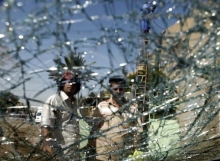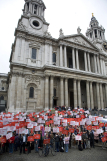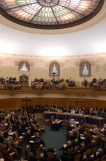
One in 50 Anglican clergy in the UK believes God is merely a human construct, a survey claims.
Just eight in ten believe there is a personal God and a further three in 100 believe there is some spirit or life force.
And in spite of two millennia of Church doctrine based on determining the mind of God through the Scriptures, nearly one in ten believes: "No-one can know what God is like."
The YouGov survey of more than 1,500 Anglican clergy commissioned by the Westminster Faith Debates for the current series on the future of the Church of England shows growing acceptance for other faiths, with more than four in ten believing that while Christianity is the "best path" to God, other religions may offer paths as well.
Although the results must be considered bearing in mind the small samples in Scotland, Wales and Ireland, clergy in the Scottish Episcopal Church were the most sceptical about God, with just over seven in ten believing in one.
One possibly surprising feature to emerge from the survey is where clergy turn to for guidance.
Fewer than one in ten, just seven per cent, rely on family and friends as they live their life and make decisions. Despite their oaths of obedience to their bishops and archbishops, no clergy at all rely on Church leaders when making decisions. Neither do they rely on science or great literature.
More than four in ten instead rely on God, a third rely on their own conscience, reason and intuition and four per cent rely on the Church, past and present.
The vast majority were opposed to assisted dying and also most believed that while clergy should lay out general principles with regard to same sex marriage, assisted dying and abortion, people should be left to decide for themselves. More than half thought same-sex marriage was wrong, and nearly four in ten thought it right. The rest did not know. On this issue, the Church of England was the least liberal and the Church in Wales the most.
On balance, Anglican clergy emerged as socially liberal and morally conservative. The biggest proportion, 44 per cent, thought the welfare budget too low. More than six in ten thought people on benefits were victims of circumstances beyond their control and they should be helped by society. They were also relatively positive about the effects of immigration.
However, nearly two in ten thought abortion should be banned altogether and a further four in ten thought the time limit should be reduced below 24 weeks.
The clergy were highly self-critical. More than a third thought the Church "stuffy and out of touch" and nearly four in ten thought it "too divided and disorganised" with nearly as many believing it to be "too privileged and comfortable." Six in ten said the Church should maintain unity by being more tolerant of diverse views.
But clergy also saw the good the Church does. Nearly seven in ten appreciated its strength at the heart of local communities and nearly six in ten believed it brought people closer to God. Half said it was a support to people in need.
Professor Linda Woodhead, of Westminster Faith Debates, said: "In both politics and ethics they are idealistic, and very concerned with protecting the weak and the poor. But these attitudes now set them apart from most of the general population and lay Anglicans.
"It's also interesting to see how different most of the more evangelical clergy are from the rest in many of their attitudes. The Church's official view that Anglicans should learn to disagree well seems to be undermined by the two-thirds of evangelical clergy who don't think that a goal worth pursuing."

















